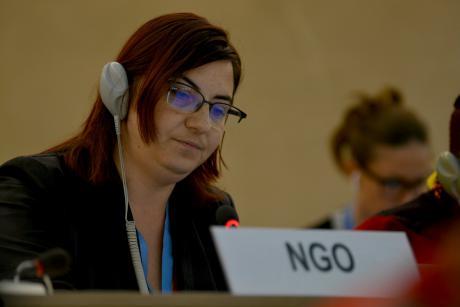This week in Geneva, members of a United Nations intergovernmental working group are discussing a long-awaited, legally binding treaty to regulate the human rights impacts of transnational corporations.
It’s about time. Today, power inequalities between states and corporations are vast. Out of the top 100 global economic entities, 69 are corporations, 31 are countries.

The combined revenues of the ten biggest corporations surpass those of more than 180 countries. Corporations are claiming responsibility for delivering public goods and global development goals, gaining access to new resources and powers through public-private partnerships (PPPs). These are key issues for all young feminists. Consolidated corporate power and corporate capture have disproportionate impacts on young women and girls.
The privatisation of public services, particularly in education and health care, has increased inequalities and compromised quality, adding to the obstacles that young women, trans youth and girls face in accessing their rights.
In countries including South Africa, when family planning services were privatised amid wider neoliberal reforms we saw the systematic introduction of user fees including on essential maternity care, assisted reproduction, abortion, and other gynaecological services. Many lost access to such services as a result, leading to unacceptably high rates of unsafe abortion and harmful self-treatment regimens.
Growing corporate influence on governments has also meant that national and international legislation privileges corporate interests, for example, in labour laws.
Young people are disproportionately impacted by the results – including deplorable working conditions, lack of access to quality public services, and failures to recognise unpaid and low-paid care work.
The plight of young migrant workers in the garment sector is a well-known example of the disposability and commodification of women’s labour; 85% of sweatshop workers are women between 15-25 years old. There is industry-wide eagerness in the media, fashion and the arts, and increasingly across sectors, to rely on the ‘precarious’ and poorly-compensated labour of young women.

According to International Trade Union Confederation research, only 6% of workers in the global supply chains of 50 large multinational companies are direct employees. Others are part of a “hidden workforce”. Significantly, precarious work prevents young workers from joining unions that could help them access needed labour protections.
Illicit financial flows (IFFs) also have a disproportionate gender impact, draining critical resources that could otherwise be allocated for the advancement of women’s human rights – a point emphasised at the first ever African Feminist Macroeconomic Academy, held in Johannesburg last week.
IFFs from Africa result in estimated losses of over $50 billion per year – with 65% of these due to commercial tax evasion and tax avoidance, including the transfer of income to tax havens. Current legal and political frameworks allow multinational corporations to benefit from tax abuse to the detriment of people and the planet.

We are living in times when it is deadly to take a stand against corporations encroaching on land and destroying the environment. According to a 2016 report by Defenders of the Earth, at least four environmental and land defenders are murdered each week.
In Honduras, environmental defender and indigenous leader Berta Cáceres was murdered last year. This year, Bertha Zúniga Cáceres, her 26-year-old daughter, survived an attempted attack by a assailants wielding machetes.
A path to ending corporate abuses is now visible, including this week’s discussions in Geneva. But states must also address gender-specific impacts of business activities.
Feminist demands include:
- Addressing corporate tax evasion as a violation of human rights, including women’s rights.
- Holding corporations accountable for environmental destruction and lowered labour standards and working conditions.
- Respecting and protecting the work of women human rights defenders.
Young feminists must join the growing mobilisation for a binding UN treaty on transnational corporations and human rights. We have the most to gain from ending corporate impunity.
2224x1253.jpg)